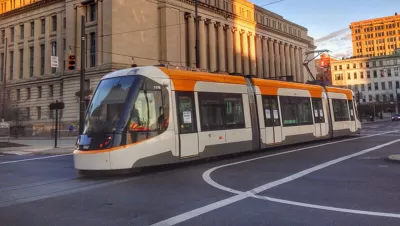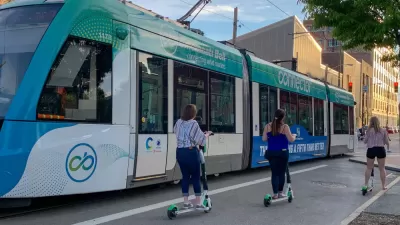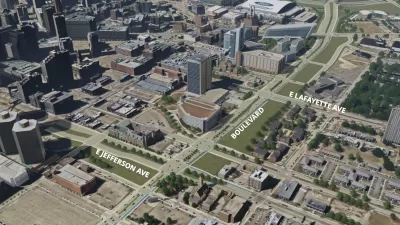The city of Cincinnati is scrambling to cover the difference on a shortfall of funding from a voluntary tax incentive contribution agreement (VTICA) system set up to support the Cincinnati Bell Connector.

Chris Wetterich reports on funding questions for the Cincinnati Bell Connector streetcar, as one funding source in particular lags behind projections. The voluntary tax incentive contribution agreement (VTICA) asks "developers to donate to the streetcar’s operations some of the savings they would receive from property tax abatements for constructing new buildings and renovating old ones," according to Wetterich.
"But VTICA has lagged and council is now left to figure out how to avoid spending down a surplus in the streetcar operations fund over the next two years while VTICA theoretically catches up," reports Wetterich. The city will receive $130,000 from VTICA in 2019, after projecting it would receive $524,000. A surplus generated by an infusion of parking revenue in 2015 will soon be exhausted. If the VTICA doesn't pick up soon, the streetcar will be about $428,000 in the red by 2020.
The article includes more detail on how the city overestimated VTICA revenue projections, and what it will possibly do as a result of the budgetary shortfall—options range from budget cuts to free rides.
FULL STORY: City Council struggles with streetcar budget as revenue source lags

Alabama: Trump Terminates Settlements for Black Communities Harmed By Raw Sewage
Trump deemed the landmark civil rights agreement “illegal DEI and environmental justice policy.”

Planetizen Federal Action Tracker
A weekly monitor of how Trump’s orders and actions are impacting planners and planning in America.

The 120 Year Old Tiny Home Villages That Sheltered San Francisco’s Earthquake Refugees
More than a century ago, San Francisco mobilized to house thousands of residents displaced by the 1906 earthquake. Could their strategy offer a model for the present?

In Both Crashes and Crime, Public Transportation is Far Safer than Driving
Contrary to popular assumptions, public transportation has far lower crash and crime rates than automobile travel. For safer communities, improve and encourage transit travel.

Report: Zoning Reforms Should Complement Nashville’s Ambitious Transit Plan
Without reform, restrictive zoning codes will limit the impact of the city’s planned transit expansion and could exclude some of the residents who depend on transit the most.

Judge Orders Release of Frozen IRA, IIJA Funding
The decision is a victory for environmental groups who charged that freezing funds for critical infrastructure and disaster response programs caused “real and irreparable harm” to communities.
Urban Design for Planners 1: Software Tools
This six-course series explores essential urban design concepts using open source software and equips planners with the tools they need to participate fully in the urban design process.
Planning for Universal Design
Learn the tools for implementing Universal Design in planning regulations.
Clanton & Associates, Inc.
Jessamine County Fiscal Court
Institute for Housing and Urban Development Studies (IHS)
City of Grandview
Harvard GSD Executive Education
Toledo-Lucas County Plan Commissions
Salt Lake City
NYU Wagner Graduate School of Public Service





























